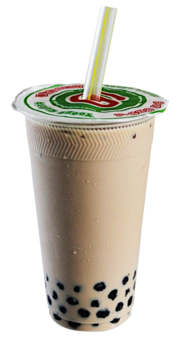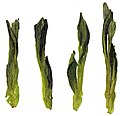Kuding (Chinese: 苦丁茶; pinyin: kǔdīng chá; lit. 'bitter nail tea'; pronounced [kʰù.tíŋ ʈʂʰǎ]) is a particularly bitter-tasting Chinese infusion, which due...
7 KB (710 words) - 16:48, 5 September 2024
to make the Black Drink. Kuding (Ilex kudingcha) - Asian holly species used with Ligustrum robustum for Chinese kǔdīng chá tea. "Ecuador's "Superleaf"...
12 KB (1,198 words) - 07:47, 8 November 2024
Yum cha is the Cantonese tradition of breakfast or brunch involving Chinese tea and dim sum. The practice is popular in Cantonese-speaking regions, including...
24 KB (2,425 words) - 12:31, 17 November 2024
Cha chaan teng (Chinese: 茶餐廳; Cantonese Yale: chàhchāantēng; lit. 'tea restaurant'), often called a Hong Kong-style cafe or diner in English, is a type...
24 KB (3,040 words) - 03:30, 18 October 2024
Mint herbal tea (redirect from Bakha-cha)
Spearmint tea Peppermint tea Peppermint tea (tea bag) Infusing bakha-cha Bakha-cha (dried leaves) Serving of mint tea Glass of mint besides mint leaves...
4 KB (285 words) - 06:37, 2 September 2024
tea ("Bohea") Chrysanthemum tea Gynostemma pentaphyllum Kuding 24 flavors — herbal Anji bai cha — green Baihao Yinzhen — white Bai Jiguan — oolong Bai...
8 KB (508 words) - 21:17, 16 March 2024
Genmaicha (redirect from Gen-mai cha)
Herbal tea Cannabis tea Chamomile Dried lime Ginger Guayusa Koththamalli Kuding Mate Rooibos...
3 KB (332 words) - 00:30, 16 July 2024
Lei cha (Chinese: 擂茶; pinyin: léi chá; lit. 'pounded tea'; pronounced [lěɪ ʈʂʰǎ]) or ground tea is a traditional Southern Chinese tea-based beverage or...
4 KB (421 words) - 08:11, 25 July 2024
Gongfu tea (redirect from Gongfu Cha)
Gongfu tea or kung fu tea (Chinese: 工夫茶 or 功夫茶; both gōngfū chá), literally "making tea with skill", is a traditional Chinese tea preparation method sometimes...
10 KB (1,511 words) - 21:40, 22 September 2024
Gunpowder tea (redirect from Zhu cha)
Gunpowder tea (Chinese: 珠茶; pinyin: zhū chá; lit. 'pearl tea'; pronounced [ʈʂú ʈʂʰǎ]) is a form of tea in which each leaf has been individually rolled...
7 KB (813 words) - 11:35, 1 October 2024
Butter tea (redirect from Po cha)
Wylie: bod ja, "Tibetan tea"), cha süma (Tibetan: ཇ་སྲུབ་མ་, Wylie: ja srub ma, "churned tea", Mandarin Chinese: sūyóu chá (酥油茶), su ja (Tibetan: སུ་ཇ,...
11 KB (1,405 words) - 20:07, 13 November 2024
Chinese tea culture (redirect from Cha dao)
traditional Chinese: 中國茶文化; pinyin: zhōngguó chá wénhuà; lit. 'Chinese tea culture') includes all facets of tea (茶 chá) found in Chinese culture throughout history...
88 KB (11,995 words) - 21:44, 4 November 2024
Tea processing (redirect from Deokkeum-cha)
post-fermentation tea in the market. Examples of various types tea Green Pu-erh tuo cha, a type of compressed raw pu-erh Huoshan Huangya tea, a Yellow tea Fuding...
37 KB (4,715 words) - 06:06, 19 September 2024
Bubble tea (redirect from Buo-Bah Nai-Cha)
global bubble tea chains include Chatime, CoCo Fresh Tea & Juice and Gong Cha. Bubble tea comes in many variations which usually consist of black tea,...
48 KB (4,742 words) - 19:21, 11 November 2024
Uji tea (宇治茶, Uji-cha) is a common name for all Japanese green tea produced from Uji, Kyoto. The three main types of Uji tea are Matcha, Sencha and Gyokuro...
22 KB (2,769 words) - 08:30, 8 October 2024
Jasmine tea (Chinese: 茉莉花茶; pinyin: mòlìhuā chá or Chinese: 香片; pinyin: xiāng piàn) is tea scented with the aroma of jasmine blossoms. Typically, jasmine...
8 KB (1,007 words) - 05:01, 17 October 2024
Compressed tea (redirect from Tuó chá)
matcha tea powders as well as the pulverized tea leaves used in the lei cha (擂茶) eaten by the Hakka people and some people in Hunan province. In ancient...
18 KB (2,079 words) - 05:58, 19 September 2024
Chashitsu (redirect from Cha-Shitsu)
Mountain Dwelling Within the City", the ideal of wabi-style tea ceremony (wabi-cha) had its roots in the urban society of the Muromachi period (1336 to 1573)...
20 KB (2,439 words) - 20:39, 2 June 2024
Longjing tea (redirect from Longjing cha)
Longjing tea (Chinese: 龍井茶; pinyin: lóngjǐng chá; Cantonese Yale: lung4 jeng2 cha4; Standard Mandarin pronunciation [lʊ̌ŋ.tɕìŋ.ʈʂʰǎ]), sometimes called...
18 KB (2,372 words) - 19:03, 27 May 2024
essential oils of kabuse-cha and normal sencha made from leaves grown unshaded in an open field. Kawakami and Yamanishi found that kabuse-cha contained large quantities...
4 KB (509 words) - 06:27, 5 October 2024
Dongfang meiren (redirect from Baihao wulong cha)
měirén chá) in Mandarin Chinese and translated as 'eastern or Oriental beauty tea' in English. More recently, the term 白毫烏龍茶 (báiháo wūlóng chá), translated...
9 KB (1,064 words) - 21:53, 31 August 2024
Herbal tea Cannabis tea Chamomile Dried lime Ginger Guayusa Koththamalli Kuding Mate Rooibos...
8 KB (915 words) - 20:30, 11 November 2024
"yin"(陰)or cooling herbs are used to make tea such as chrysanthemum and kuding tea (苦丁茶). Cooled (but still warm) tea was popular throughout ancient times...
14 KB (1,714 words) - 07:15, 23 October 2024
Dianhong tea (Chinese: 滇紅茶; pinyin: Diān hóng chá; lit. 'Yunnan red tea'; pronounced [tjɛ́n xʊ̌ŋ ʈʂʰǎ]) is a type of relatively high-end, gourmet Chinese...
5 KB (558 words) - 23:34, 29 June 2024
List of Chinese teas "An Ji Bai Cha". Archived from the original on 2016-03-10. Retrieved 2016-02-24. "Anji Bai Cha Green Tea of Zhejiang". Yunnan Sourcing...
4 KB (319 words) - 01:06, 19 October 2024
Ginger tea (redirect from Saenggang-cha)
called Shōgayu (生姜湯).[relevant?] In Korea, ginger tea is called saenggang-cha (생강차; 生薑茶, [sɛ̝ŋ.ɡaŋ.tɕʰa]). It can be made either by boiling fresh ginger...
16 KB (1,342 words) - 17:23, 19 October 2024
be as long as 15 centimetres (5.9 in). They are plucked from the Shi Da Cha, a large-leaf variety found only in Anhui Province. Falsification is rampant...
3 KB (270 words) - 11:37, 30 October 2023
cold. It was originally served at dai pai dongs (open air food vendors) and cha chaan tengs (cafés), but is now available in various types of restaurants...
9 KB (658 words) - 15:14, 19 August 2024
Tea (simplified Chinese: 大观茶论; traditional Chinese: 大觀茶論; pinyin: Dàguān Chá Lùn) is a book written by the Chinese Emperor Huizong of the Song dynasty...
3 KB (326 words) - 01:39, 7 June 2024




























